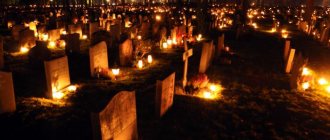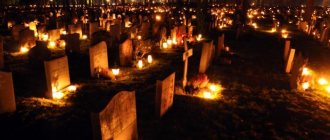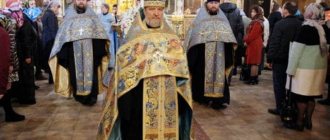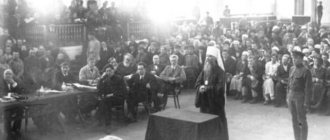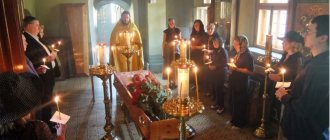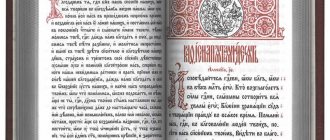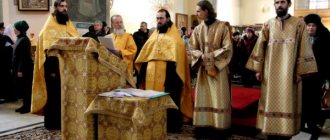Praying for deceased relatives and friends is one of the good customs of Christianity. The sacred text, which is read by believers, has a deep meaning. This is love for the deceased, the desire for his soul to be clean from sins. Many believe that the high cost of a monument in a cemetery and a wake with food on the table is the best thing that can be done for a deceased person. In fact, this is not true. The human soul receives the True Grace of the Lord God only when it is remembered and candles are lit for it in church, reading an akathist for the one who died.
About the author About the book
The meaning of the akathist for the one who died
After death, a person cannot pray for himself. That is why those closest to you should come to church and pray to God for all the sins of those who are in another world.
An akathist is a special chant, a special hymn that should only be read while standing. Ordeal is what happens to the soul of every person when he dies. All this lasts for 40 painful days. For the first 3 days, the shower is only at your own coffin, next to all your relatives. From 3 to 9 days - she soars and looks at what awaits her in the sky. And before the 40th day, the most difficult torment and suffering begins, which seems to last for an eternity.
Here it is worth remembering that for a deceased person it is not so important what his monument is; something material does not become a priority anymore. The soul must feel good, unite with others, be cleansed of earthly sins and become one of the spirits.
Work as a courier at Yandex.Eda (up to 3,400 rubles per shift) leave a request →
How then does an akathist for one who died help? This is a kind of help that is so important to those who left the earth. Akathist helps the soul to start a new right path. Relatives ask the Lord God for forgiveness for the deceased, beg him for mercy and a speedy departure to heaven. That is why reading the akathist is extremely important, if only because it will be much easier for the soul of a loved one to survive these 40 terrible days of ordeal.
What is an akathist
Akathist is a hymn, a chant that is read while standing. The very first akathist in Christianity is dedicated to the Mother of God. It was created in the 7th century in gratitude to the Mother of God for the liberation of Constantinople from the Persian army. It is this akathist that is called the Great. According to the Charter, it is included in church services.
All other akathists (translations or original Slavic expositions) appeared everywhere throughout the history of Christianity in Rus'. Later, entire collections of such texts began to be published. They are hymns of praise to the saints, the Savior, and the Mother of God. The authors are clergy, spiritual writers or teachers of theological schools and seminaries.
In order for the akathist to be included in the service, it is sent for consideration to the Committee of Spiritual Censorship. The Committee's decision is forwarded to the Holy Synod. After which a hymn that meets the requirements may be included in the worship service and thus will be printed in the official spiritual collection.
Structure of the akathist about the one who died
The structure of the hymn consists of 25 songs - 13 kontakia and 12 ikos. They alternate. The unpaired, 13th kontakion is worn three times. After it, the first ikos is read and again the first kontakion.
The word “akathist” translated from Greek means “unsaddled song.” That is, you cannot sit during the anthem.
The first kontakion and all ikos end with the call “Rejoice.” The remaining 12 kontakia end with the word “hallelujah.” The anthem is most often read at home. Therefore, it is quite possible to pronounce it without the special blessing of the priest.
Opinions of clergy about the akathist
The Holy Fathers do not always welcome the reading of akathists about the one who died. Some of them admit that the commemoration of the dead can be combined with this hymn. The essence of the akathist is a joyful, laudatory song. In Orthodoxy there is no death as such. And there is the repose of the soul into eternal life. The Savior's victory over death, the immortality of the soul and its union with the Lord is joy for a Christian. Therefore, the akathist for the one who died should be read with this attitude.
There is another opinion on this matter. Thus, some clergy claim that the akathist for the one-dead (one-dead) is of dubious origin. This statement is based on some facts.
- The inner meaning of the anthem is contradictory. This is the praise of the Lord, the Mother of God or the saints, and not intercession for the dead.
- The Akathist does not have the permission of His Holiness the Patriarch or the liturgical commission.
- Replacing the reading of the Psalter with an akathist will not bring peace of mind either to the living or to the deceased.
Therefore, the solution to the laity’s question about how to correctly read the akathist for the one who died should begin by agreeing on it with their priest. Only with his approval is it permissible to read this hymn.
The ordeal of the soul after death
According to various cases, testimonies and church experience, the human soul, after the final exit from the body (death), sometimes on the third day, begins to undergo ordeals.
Ordeal - a word from the old lexicon
The Kingdom of Heaven is a specific place in spiritual space where the soul rises intuitively or with the help of Angels. On the path of ascension, she is hindered by demonic forces that demand their own - after all, a person sinned, which means he became like them. So they demand theirs. It is important that demons also lie about a person’s actions, invent their own, and put them in a different light. If the soul begins to be indignant, it can be immediately seized for its humility. After all, this is the last exam for a person.
The ordeal lasts 40 days. Without exaggeration, we can say that this is the most responsible and difficult time for a person, because the fate of his permanent stay in eternity is being decided. It is then that it will be decided where he will be: in the kingdom of love with God or in any country of hatred and torment.
Should the orphaned worry about themselves and cry for the departed? After all, he is only temporarily sent to a place from where he will not be able to contact you (or rarely, through sleep). It's hardly worth wasting your precious time. And you should quickly turn to the prayer book and finally begin to help the departed with your fervent and godly prayer, saving you from vile demons.
Is it possible to read an akathist at a grave?
Visiting the cemetery is the responsibility of friends and relatives of the deceased. But you shouldn’t go to the grave against your will. A sincere desire to help the deceased should be the reason for visiting the cemetery or praying for the deceased.
You cannot hold a wake at a grave - for Christians, only prayers and kind words about the deceased are optimal. You can light candles and tidy up. Relatives sometimes ask the Holy Fathers: “How to pronounce an akathist for one who died in a cemetery? Is it possible to read it on the grave?”
If there are a lot of people in the cemetery, then reading the akathist is unlikely to be beneficial. You should not be distracted from prayer by worldly concerns. Therefore, it is better to come to the cemetery on a day when no one will be nearby. Prayer words should sound in silence and calm. Then intercession for the deceased will benefit him. You can light candles and bring a small icon.
The clergy especially insist that there should be no wreaths or artificial flowers on the graves of Christians. Fresh flowers are a symbol of life and Resurrection. Therefore, it is better to bring one fresh flower to the grave than to cover it with artificial wreaths.
The grave in Orthodoxy is considered the place of future ascension. It must be kept clean and tidy. The immortal soul feels the need for constant prayer, since it cannot ask for itself. Reading the akathist and prayers at the grave of the deceased is the duty of a Christian.
What to do if the deceased was unbaptized
In this case, home (or cell) prayer will be simply invaluable . In the Church they will not pray for the unbaptized - not out of malice, not because they are “not ours.” And according to God's law about the will of man. If the deceased did not accept Christ, then the Church sacredly observes his choice. But you can always ask a Christian to pray for the unbaptized, because prayer at home for the unbaptized will please God.
You can also always pray for the non-Christian martyr Uar. This saint has the special grace to beg the souls of non-Christians from hell for life in the Heavenly Kingdom.
In conclusion, I would like to say about the alms that are given for the deceased. It may not always be monetary, but it is always able to help pull the soul out of the underworld. You can visit hospitals and help care for the sick, visit orphanages, feed birds and animals, especially in winter, and, of course, pray.
The Orthodox Church has many examples of how the dead expect prayers from them from the people remaining on earth: they appear in reality in a dream, transmit through the dreams of other people, sometimes even with the special blessing of God they call on the phone (a common phenomenon lately), and indicate to the need for prayerful remembrance of oneself.
Christian love is immortal , and those who have passed on to another world are not dead, but alive, and love us even more, since the human soul is immortal, and after leaving the damaged body, all its feelings become clear and unclouded. Therefore, if a person ends up in hell, then not only does the love of those remaining on earth become burning, but also the torments of hell are experienced by the soul to the fullest. That is why the prayer for the repose of the soul of the person presented is so significant.
How to help the deceased?
Deceased relatives and friends need help from the living. The clergy assure that with sincere and constant appeals to the Heavenly Father, one can beg a soul even from hell.
No one knows where the soul will be found after death until the Last Judgment. Therefore, the spiritual help of loved ones and relatives will always be relevant. At the liturgy in the church, all baptized deceased are remembered (to do this, you must submit a note with the name of the deceased). You can order a sorokoust - then he will be commemorated at the service for all 40 days. It is optimal to order a memorial service in the church on days 3, 9, 40.
Good deeds are the same intercession for the deceased. Almsgiving, helping the sick or the poor is a charity that will contribute to the atonement of sins and the acquisition of grace. Righteous John of Kronstadt warned that if there is no love for one's neighbor, then alms will be in vain. Only with kindness and a sincere heart, with regret for poverty or illness, is it worth doing deeds of mercy. Alms are a benefit primarily for the one who gives them.
The amount of donations or the number of funeral services ordered is not important. The only thing that matters is the feeling with which a person asks for the deceased.
An akathist for the one who died is also an intercession. When should I read it? Immediately after death, 40 days in a row and 40 days before the anniversary. Prayers make the afterlife easier. The good memory of the deceased must be accompanied by deeds. Clean up the grave, plant flowers, put up a cross. Such simple actions are not always performed by relatives. The loss of a loved one is a great grief. Good deeds will help overcome despair. Daily prayers will calm the hearts of those who remember and will benefit the deceased.
There is no death
The first thing that anyone suffering from the loss of a loved one should understand is that, by and large, death as such does not exist . That is, the old Soviet attitude towards passing away from life, “there was a man and there is no man,” fortunately, turns out to be completely untenable. And, what is even more comforting, in this matter science is completely on the side of faith.
It has been proven that the very fact of life of a person’s personality does not depend on his brain. If the brain is damaged, then consciousness can be blocked while the person's soul is connected to the body. But when the body ceases to function, even temporarily (clinical death), then the soul, and therefore a person’s self-consciousness, can be freed either completely, if the body is completely dead, or temporarily.
We are sure that you will be interested in the article about prayers to the Blessed Virgin Mary for children.
How to read an akathist
Parishioners often ask the clergy: “Akathist for the one who died... How to read it? Is it necessary to stand during prayer?”
Akathist is a self-sufficient prayer. It can be read in church at a prayer service or at home. In some cases, it is combined with the canon of the saint or combined with a funeral litia. But most often, clergy advise reading the akathist itself and the prayer after it. A headscarf is required for women only when visiting the temple. At home, prayer reading without covering the head is allowed.
Prayers before the akathist for the same deceased are read at the discretion of relatives. For example:
- “Our Father” 3 times;
- “Lord, have mercy” 12 times;
- “Come, let us worship”;
- Psalm 50;
- the akathist himself;
- prayer after the akathist;
- "It's worthy to eat."
It is not necessary to stand during the recitation of the anthem. If there are health problems, then it is permissible to pronounce words while sitting or even lying down. Prayers at home are read at the request of the laity.
